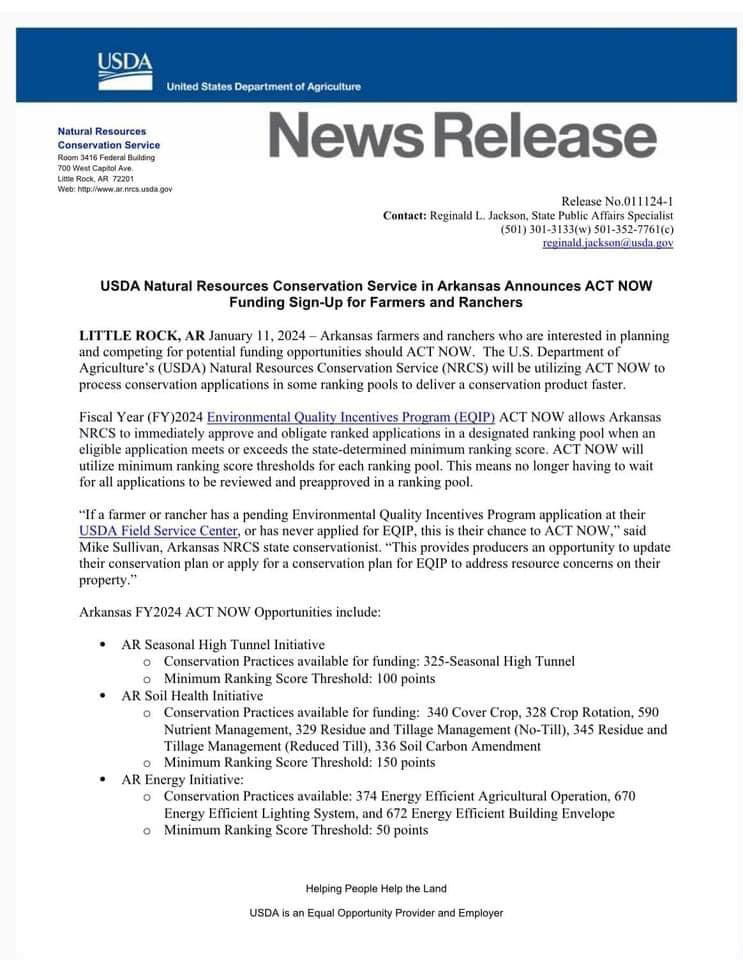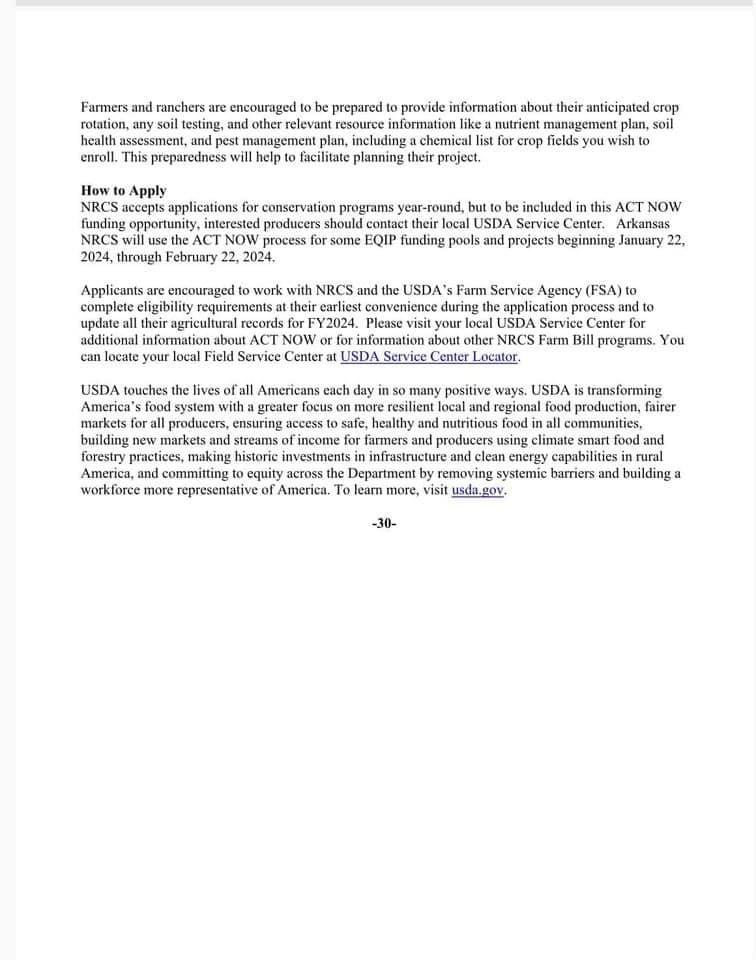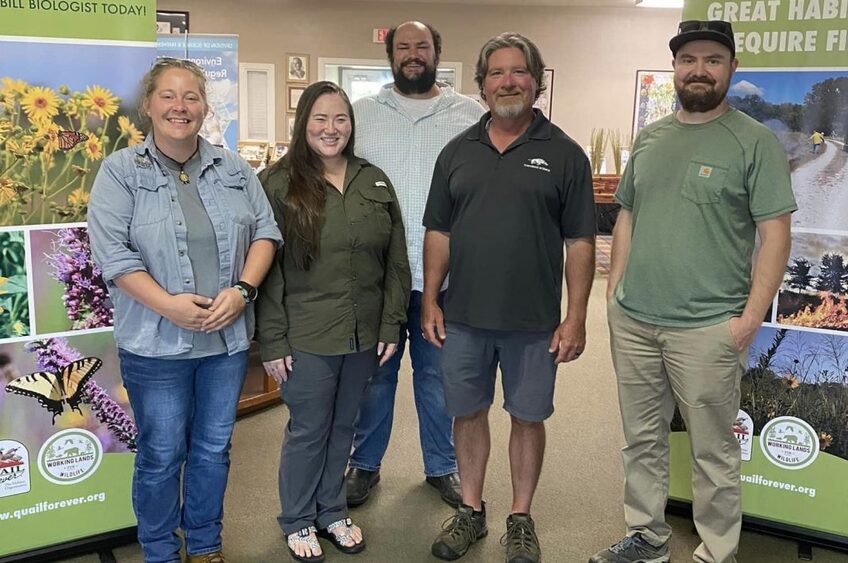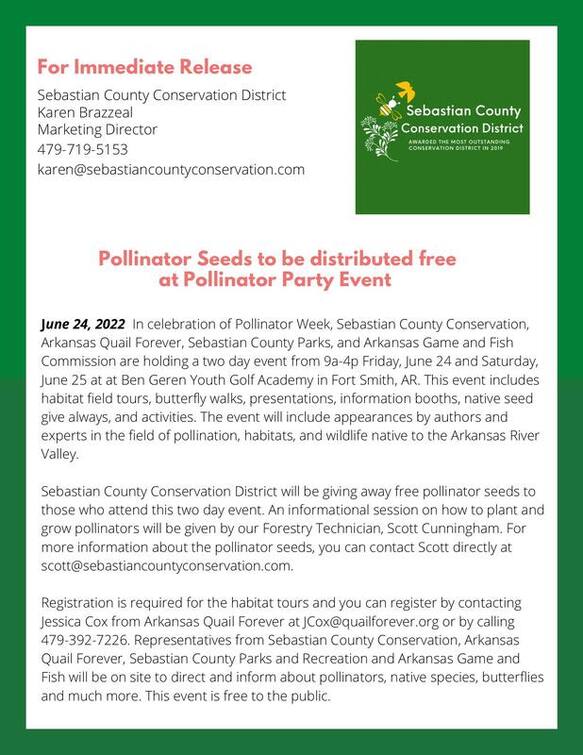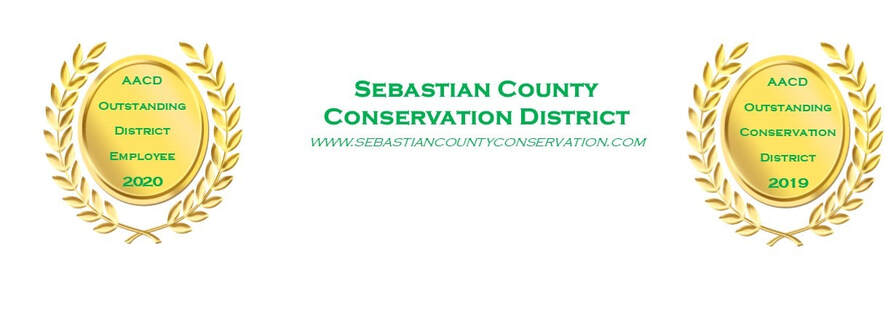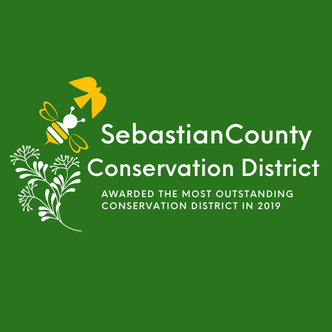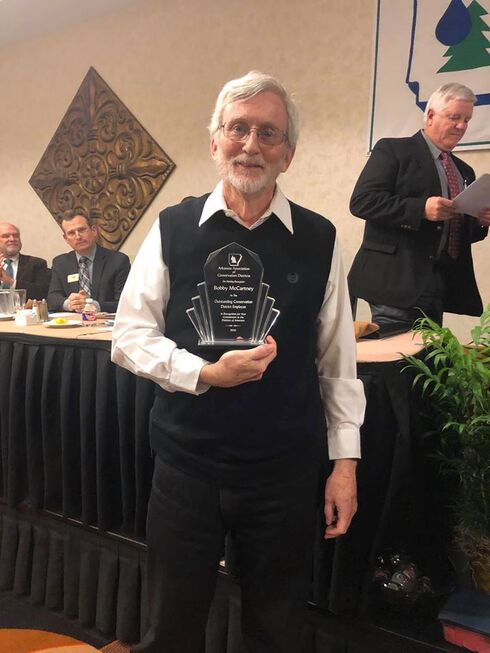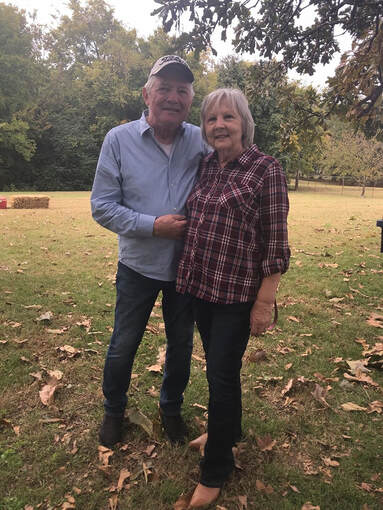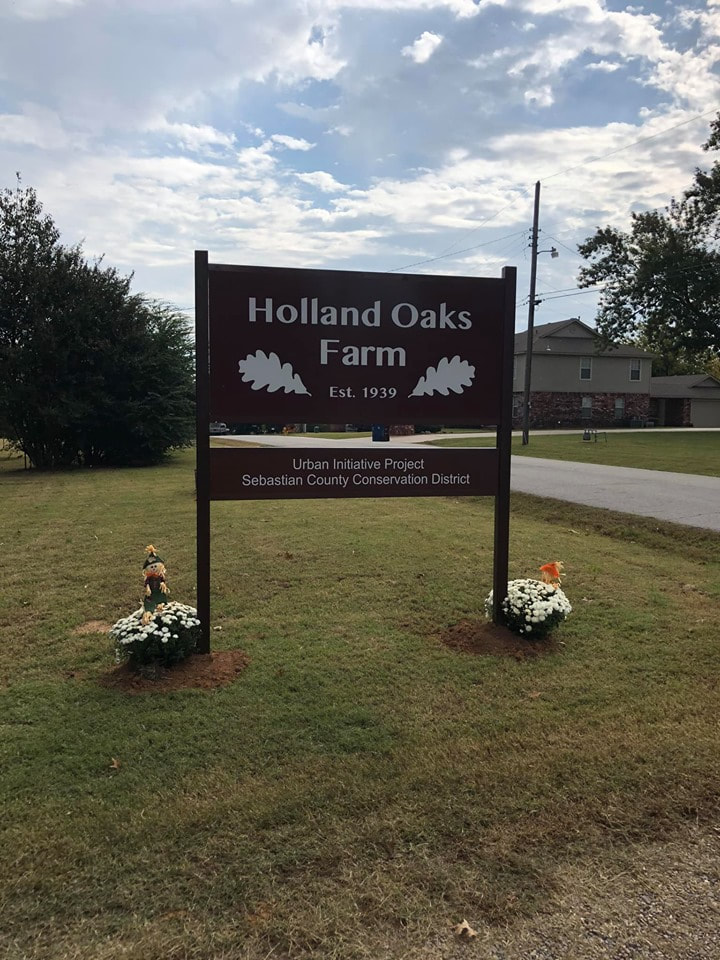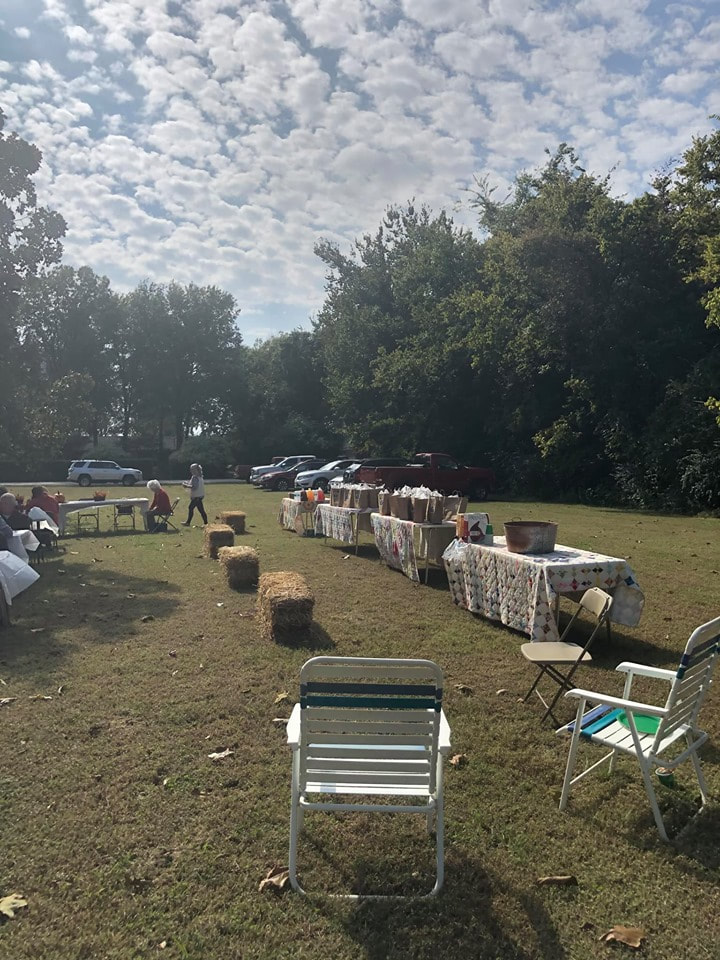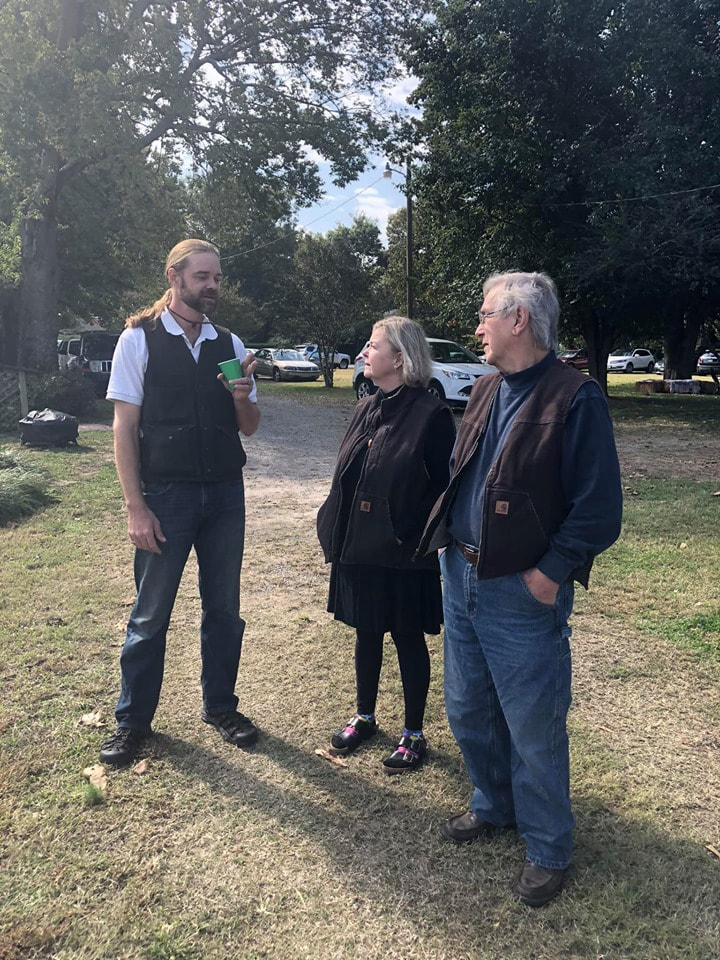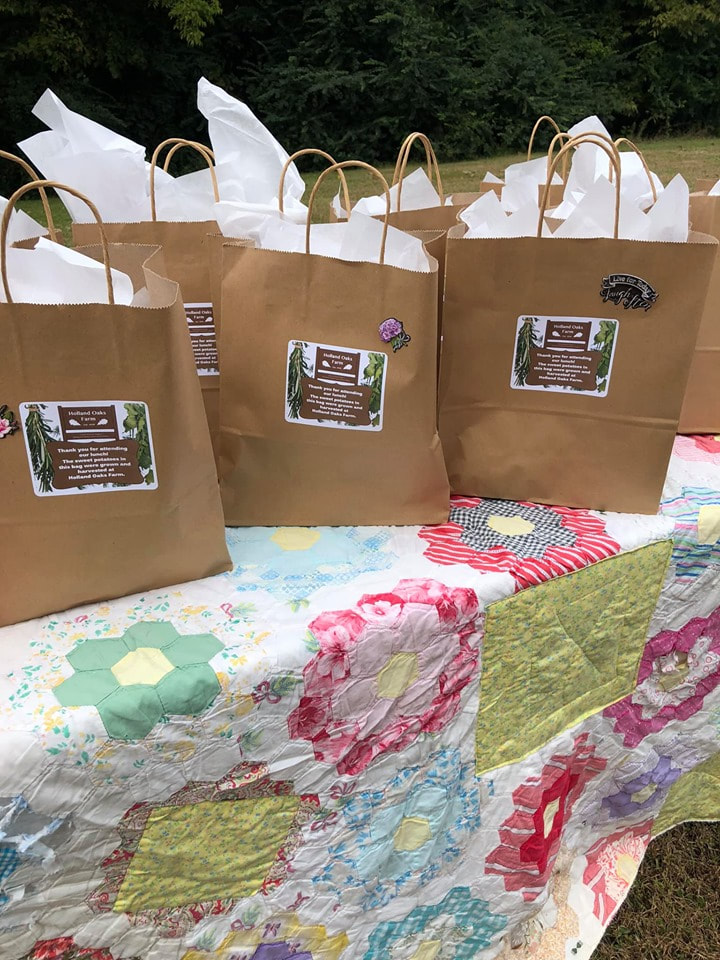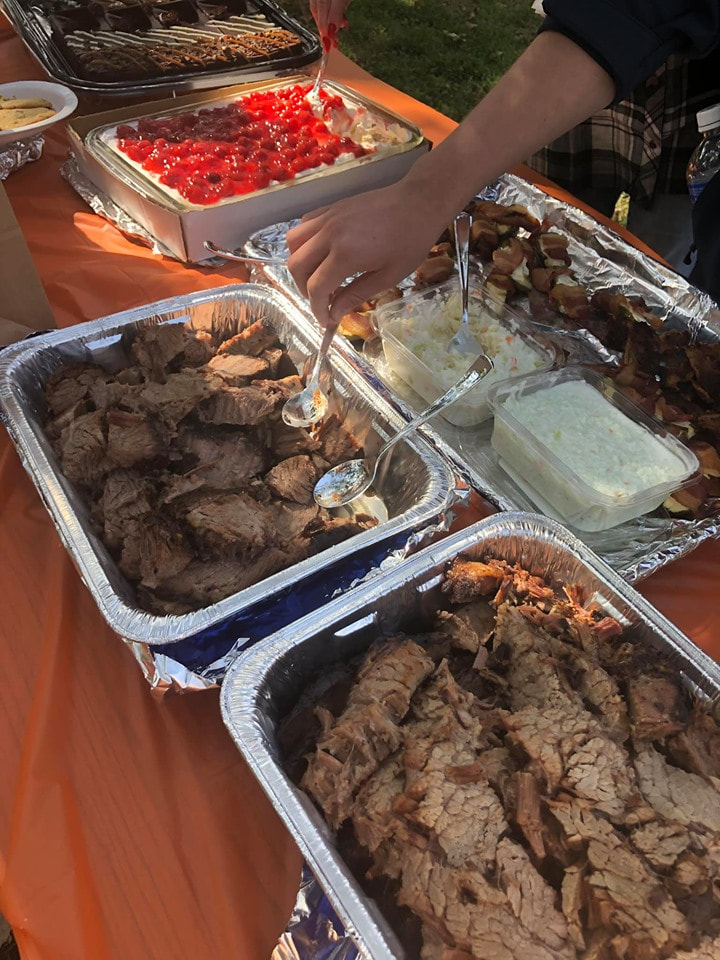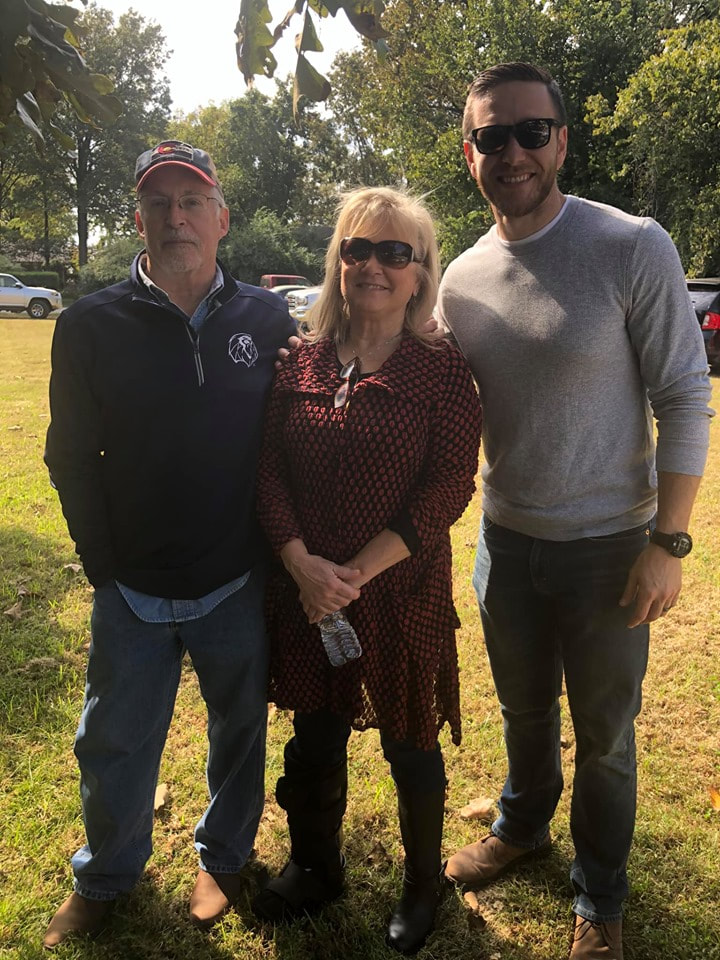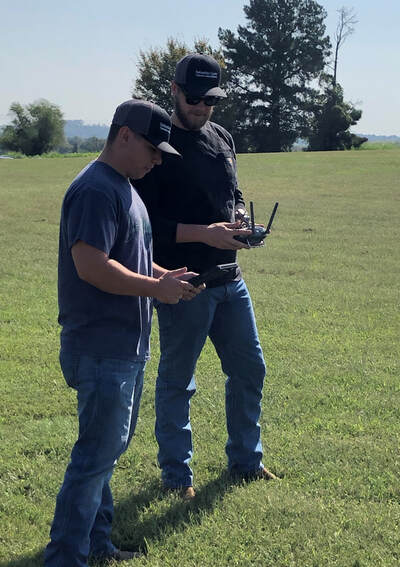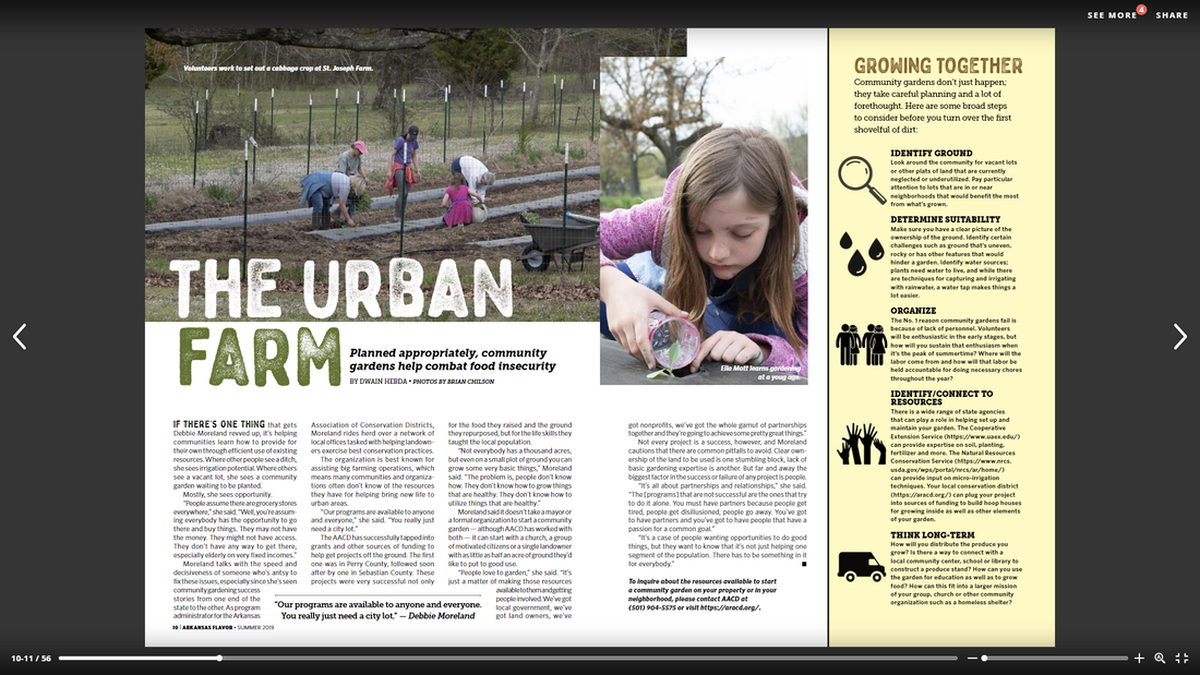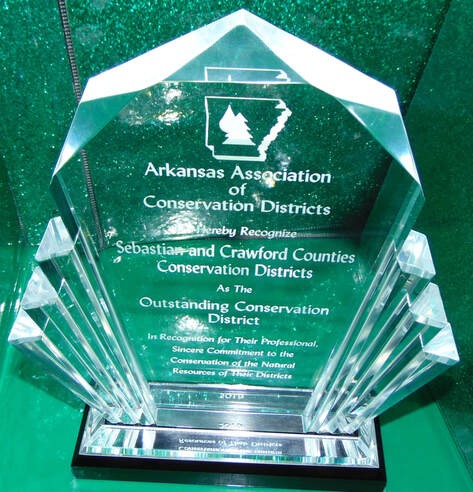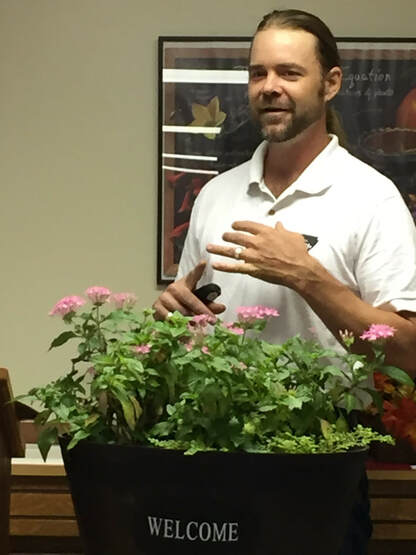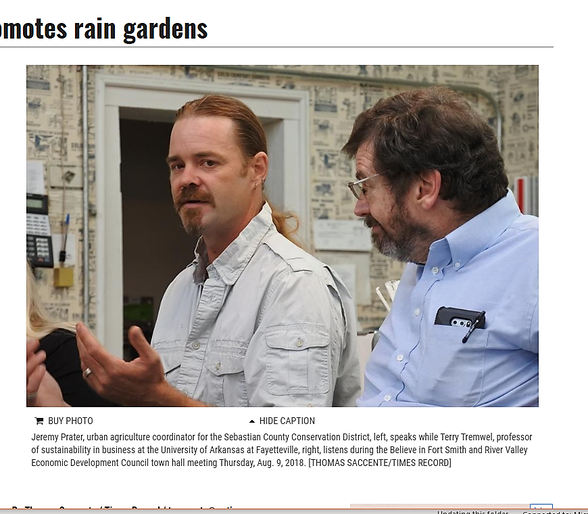Release No.: 051523-01
Contact: Reginald L. Jackson, State Public Affairs Specialist
(501) 301-3133(w) 501-352-7761(c)
[email protected]
NRCS Announces $75 Million to Assist Producers Transitioning to Organic as Part of USDA’s Organic Transition Initiative
LITTLE ROCK, Ark., May 15, 2023 - The U.S. Department of Agriculture (USDA) today announced details around its $75 million investment in conservation assistance for producers transitioning to organic production. As part of the multi-agency Organic Transition Initiative (OTI), USDA’s Natural Resources Conservation Service (NRCS) will dedicate financial and technical assistance to a new organic management standard and partner with new organic technical experts to increase staff capacity and expertise.
The investment, which includes funds from the 2020 Coronavirus Aid, Relief, and Economic Security Act (CARES Act), will help build new and better markets and income streams, strengthen local and regional food systems and increase affordable food supply for more Americans, while promoting climate-smart agriculture and ensuring equity for all producers.
“Producers transitioning to organic can count on NRCS for assistance through the process,” said Arkansas NRCS State Conservationist Mike Sullivan. “By strengthening our technical proficiency and providing technical and financial assistance through new tools and practices, we can better support producers through the challenges of organic transition.”
Direct Farmer Assistance
NRCS will dedicate $70 million to assist producers with a new organic management standard under the Environmental Quality Incentives Program (EQIP).
NRCS will help producers adopt the new organic management standard, which allows flexibility for producers to get the assistance and education they need such as attending workshops or requesting help from experts or mentors. It supports conservation practices required for organic certification and may provide foregone income reimbursement for dips in production during the transition period.
Higher payment rates and other options are available for underserved producers including socially disadvantaged, beginning, veteran, and limited resource farmers and ranchers.
The OTI-specific practices included under EQIP in this sign-up are:
How to Apply
Eligible producers include farmers, ranchers, forest landowners, and other producers beginning or in the process of transitioning to organic certification. NRCS accepts program applications on a continuous basis but sets dates to batch and rank applications as funding allows. While applications are accepted year-round, applications submitted by June 15, 2023, will be considered for this round of funding. Applications received after June 15, 2023, will be considered in later funding periods, subject to funding availability.
Notice of Funding for Seven New Positions
NRCS will dedicate $5 million to partner with six organic technical experts through five-year agreements. The organic experts will develop regional networks and support NRCS staff who provide services to USDA customers. These services include hosting hands-on organic training and fielding organic-related staff questions. One organic research position will support this network.
A Notice of Funding Opportunity, closing on June 11, 2023, outlines requirements for proposals from regional organizations and partners.
About the Organic Transition Initiative
These NRCS investments are part of the OTI, a multi-agency $300 million effort to support organic and transitioning producers. OTI also includes farmer-to-farmer mentoring, direct support for crop insurance, and market development projects.
In addition to NRCS, USDA’s Agricultural Marketing Service (AMS) and Risk Management Agency (RMA) are the primary agencies supporting OTI and are closely collaborating on implementation. As part of OTI’s cross-agency coordination, NRCS organic specialists will be closely connected with the AMS Transition to Organic Partnership Program regional partners, to align and share resources and best practices. NRCS and AMS’s National Organic Program also plan to coordinate data collection activities, to prevent transitioning farmers from having to submit duplicative information as much as possible. AMS will also soon announce a funding program to support the creation of new and improved markets for domestically produced organic products and provide critical companion resources to existing and transitioning organic producers.
RMA reminds producers interested in the Transitional and Organic Grower Assistance Program, also part of OTI, to visit with their crop insurance agent for more information. Premium benefits for eligible policies will be automatically applied to the producer’s billing statement later this year.
Other USDA Organic Assistance
OTI complements existing assistance for organic producers, including FSA’s Organic Certification Cost Share Program which helps producers obtain or renew their organic certification.
RMA also administers federal crop insurance options, including Whole Farm Revenue Protection and Micro Farm, which may be good options for organic producers.
The National Organic Program is a federal regulatory program, administered by AMS, that develops and enforces consistent national standards for organically produced agricultural products sold in the United States.
More Information
For more information, visit farmers.gov/organic.
USDA touches the lives of all Americans each day in so many positive ways. Under the Biden-Harris administration, USDA is transforming America’s food system with a greater focus on more resilient local and regional food production, fairer markets for all producers, ensuring access to safe, healthy, and nutritious food in all communities, building new markets and streams of income for farmers and producers using climate-smart food and forestry practices, making historic investments in infrastructure and clean energy capabilities in rural America, and committing to equity across the Department by removing systemic barriers and building a workforce more representative of America. To learn more, visit usda.gov.
###
Contact: Reginald L. Jackson, State Public Affairs Specialist
(501) 301-3133(w) 501-352-7761(c)
[email protected]
NRCS Announces $75 Million to Assist Producers Transitioning to Organic as Part of USDA’s Organic Transition Initiative
LITTLE ROCK, Ark., May 15, 2023 - The U.S. Department of Agriculture (USDA) today announced details around its $75 million investment in conservation assistance for producers transitioning to organic production. As part of the multi-agency Organic Transition Initiative (OTI), USDA’s Natural Resources Conservation Service (NRCS) will dedicate financial and technical assistance to a new organic management standard and partner with new organic technical experts to increase staff capacity and expertise.
The investment, which includes funds from the 2020 Coronavirus Aid, Relief, and Economic Security Act (CARES Act), will help build new and better markets and income streams, strengthen local and regional food systems and increase affordable food supply for more Americans, while promoting climate-smart agriculture and ensuring equity for all producers.
“Producers transitioning to organic can count on NRCS for assistance through the process,” said Arkansas NRCS State Conservationist Mike Sullivan. “By strengthening our technical proficiency and providing technical and financial assistance through new tools and practices, we can better support producers through the challenges of organic transition.”
Direct Farmer Assistance
NRCS will dedicate $70 million to assist producers with a new organic management standard under the Environmental Quality Incentives Program (EQIP).
NRCS will help producers adopt the new organic management standard, which allows flexibility for producers to get the assistance and education they need such as attending workshops or requesting help from experts or mentors. It supports conservation practices required for organic certification and may provide foregone income reimbursement for dips in production during the transition period.
Higher payment rates and other options are available for underserved producers including socially disadvantaged, beginning, veteran, and limited resource farmers and ranchers.
The OTI-specific practices included under EQIP in this sign-up are:
- Organic Management (Practice Code 823)
- Conservation Plan Supporting Organic Transition (Practice Code 138)
- Transition to Organic Design (Practice Code 140)
- Conservation Cover (Practice Code 327)
- Conservation Crop Rotation (Practice Code 328)
- Cover Crops (Practice Code 340)
- Field Borders (Practice Code 386)
- Nutrient Management (Practice Code 590)
How to Apply
Eligible producers include farmers, ranchers, forest landowners, and other producers beginning or in the process of transitioning to organic certification. NRCS accepts program applications on a continuous basis but sets dates to batch and rank applications as funding allows. While applications are accepted year-round, applications submitted by June 15, 2023, will be considered for this round of funding. Applications received after June 15, 2023, will be considered in later funding periods, subject to funding availability.
Notice of Funding for Seven New Positions
NRCS will dedicate $5 million to partner with six organic technical experts through five-year agreements. The organic experts will develop regional networks and support NRCS staff who provide services to USDA customers. These services include hosting hands-on organic training and fielding organic-related staff questions. One organic research position will support this network.
A Notice of Funding Opportunity, closing on June 11, 2023, outlines requirements for proposals from regional organizations and partners.
About the Organic Transition Initiative
These NRCS investments are part of the OTI, a multi-agency $300 million effort to support organic and transitioning producers. OTI also includes farmer-to-farmer mentoring, direct support for crop insurance, and market development projects.
In addition to NRCS, USDA’s Agricultural Marketing Service (AMS) and Risk Management Agency (RMA) are the primary agencies supporting OTI and are closely collaborating on implementation. As part of OTI’s cross-agency coordination, NRCS organic specialists will be closely connected with the AMS Transition to Organic Partnership Program regional partners, to align and share resources and best practices. NRCS and AMS’s National Organic Program also plan to coordinate data collection activities, to prevent transitioning farmers from having to submit duplicative information as much as possible. AMS will also soon announce a funding program to support the creation of new and improved markets for domestically produced organic products and provide critical companion resources to existing and transitioning organic producers.
RMA reminds producers interested in the Transitional and Organic Grower Assistance Program, also part of OTI, to visit with their crop insurance agent for more information. Premium benefits for eligible policies will be automatically applied to the producer’s billing statement later this year.
Other USDA Organic Assistance
OTI complements existing assistance for organic producers, including FSA’s Organic Certification Cost Share Program which helps producers obtain or renew their organic certification.
RMA also administers federal crop insurance options, including Whole Farm Revenue Protection and Micro Farm, which may be good options for organic producers.
The National Organic Program is a federal regulatory program, administered by AMS, that develops and enforces consistent national standards for organically produced agricultural products sold in the United States.
More Information
For more information, visit farmers.gov/organic.
USDA touches the lives of all Americans each day in so many positive ways. Under the Biden-Harris administration, USDA is transforming America’s food system with a greater focus on more resilient local and regional food production, fairer markets for all producers, ensuring access to safe, healthy, and nutritious food in all communities, building new markets and streams of income for farmers and producers using climate-smart food and forestry practices, making historic investments in infrastructure and clean energy capabilities in rural America, and committing to equity across the Department by removing systemic barriers and building a workforce more representative of America. To learn more, visit usda.gov.
###
Release No.: 020623
Contact: Reginald Jackson, State Public Affairs Specialist
(501) 301-3133(w) 501-352-7761(c)
[email protected]
USDA Natural Resources Conservation Service Accepting 2023 EQIP- High Tunnel Applications through March. 13, 2023
LITTLE ROCK, Ark., Feb. 6, 2023 –The United States Department of Agriculture's (USDA) Natural Resources Conservation Service (NRCS) in Arkansas will provide at least $1 million in fiscal year 2023 for the utilization and implementation of high tunnels on agricultural land through the Environment Quality Incentives Program (EQIP).
High Tunnels are designed to help producers extend the growing season, increase productivity, keep plants at a steady temperature, and conserve water and energy. The EQIP high tunnel signup will be administered through the ACT NOW approach, which is a targeted, rapid, and streamlined application and contract approval process.
The EQIP-High Tunnel application deadline is March 13, 2023, however through the streamlined application and contract approval approach, applications will be assessed and ranked as they are submitted to the USDA Field Service Center. Based on funds availability, application assessments with a ranking score of 100 points or greater will be preapproved immediately for the first batch of funding. Producers are encouraged to apply for the High Tunnel funds at their earliest convenience. Additional sign-up batches may be announced at a later date, subject to the availability of funding.
All USDA Service Centers are open for business. Visitors wishing to conduct business with NRCS should call ahead and schedule an appointment. To locate a local field office, visit https://offices.sc.egov.usda.gov/locator/app.
-30-
REGINALD L. JACKSON | State Public Affairs Specialist
United States Department of Agriculture’s Natural Resources Conservation Service
700 West Capitol Ave., Room 3416, Federal Building | Little Rock, AR 72201
( 501-301-3133|855-681-7044 (fax)|* [email protected] | www.ar.nrcs.usda.gov |www.farmers.gov
Contact: Reginald Jackson, State Public Affairs Specialist
(501) 301-3133(w) 501-352-7761(c)
[email protected]
USDA Natural Resources Conservation Service Accepting 2023 EQIP- High Tunnel Applications through March. 13, 2023
LITTLE ROCK, Ark., Feb. 6, 2023 –The United States Department of Agriculture's (USDA) Natural Resources Conservation Service (NRCS) in Arkansas will provide at least $1 million in fiscal year 2023 for the utilization and implementation of high tunnels on agricultural land through the Environment Quality Incentives Program (EQIP).
High Tunnels are designed to help producers extend the growing season, increase productivity, keep plants at a steady temperature, and conserve water and energy. The EQIP high tunnel signup will be administered through the ACT NOW approach, which is a targeted, rapid, and streamlined application and contract approval process.
The EQIP-High Tunnel application deadline is March 13, 2023, however through the streamlined application and contract approval approach, applications will be assessed and ranked as they are submitted to the USDA Field Service Center. Based on funds availability, application assessments with a ranking score of 100 points or greater will be preapproved immediately for the first batch of funding. Producers are encouraged to apply for the High Tunnel funds at their earliest convenience. Additional sign-up batches may be announced at a later date, subject to the availability of funding.
All USDA Service Centers are open for business. Visitors wishing to conduct business with NRCS should call ahead and schedule an appointment. To locate a local field office, visit https://offices.sc.egov.usda.gov/locator/app.
-30-
REGINALD L. JACKSON | State Public Affairs Specialist
United States Department of Agriculture’s Natural Resources Conservation Service
700 West Capitol Ave., Room 3416, Federal Building | Little Rock, AR 72201
( 501-301-3133|855-681-7044 (fax)|* [email protected] | www.ar.nrcs.usda.gov |www.farmers.gov
USDA NRCS News Release: Biden-Harris Administration Announces Availability of Inflation Reduction Act Funding for Climate-Smart Agriculture Nationwide
LITTLE ROCK, Ark., Feb. 14, 2023 –Agriculture Secretary Tom Vilsack recently announced the United States Department of Agriculture (USDA) is making funding available for agricultural producers and forest landowners nationwide to participate in voluntary conservation programs and adopt climate-smart practices. The Inflation Reduction Act (IRA) provided an additional $19.5 billion over five years for climate smart agriculture through several of the conservation programs that USDA’s Natural Resources Conservation Service (NRCS) implements. NRCS is making available $850 million in fiscal year 2023 for its oversubscribed conservation programs: the Environmental Quality Incentives Program (EQIP), Conservation Stewardship Program (CSP), Agricultural Conservation Easement Program (ACEP) and Regional Conservation Partnership Program (RCPP).
“The Inflation Reduction Act provided a once-in-a-generation investment in conservation on working lands, and we want to work with agricultural and forest landowners to invest in climate-smart practices that create value and economic opportunity for producers,” said Vilsack, who spoke at the National Association of Conservation Districts annual meeting in New Orleans. “We know that agriculture plays a critical role in the nation’s effort to address climate change, and we are using this funding to bolster our existing programs, maximize climate benefits, and foster other environmental benefits across the landscape.”
The IRA funding includes an additional $8.45 billion for EQIP, $4.95 billion for RCPP, $3.25 billion for CSP, and $1.4 billion for ACEP. The increased funding levels begin in fiscal year 2023 and rapidly build over four years. These additional investments are estimated to help hundreds of thousands of farmers and ranchers apply conservation to millions of acres of land. Additionally, the IRA provides $300 million to quantify carbon sequestration and greenhouse gases (GHG) through the collection and use of field-based data to assess conservation outcomes. Information gained through this effort will be used to improve practices and technical assistance to customers. Further guidance on this important work will be provided as the implementation of this portion of the IRA continues.
“These funds will provide direct climate mitigation benefits,” said Mike Sullivan, NRCS state conservationist in Arkansas. “They will also expand access to financial and technical assistance for producers to advance conservation on their farm, ranch or forest land through practices like cover cropping, conservation tillage, wetland restoration, prescribed grazing, nutrient management, tree planting and more.”
To ensure we can quantify the benefits of these IRA investments, NRCS is working to support Department-wide work on Measurement, Monitoring, Reporting and Verification (MMRV). The IRA provided targeted funding to support this effort. In administering the Inflation Reduction Act climate investments, USDA will also support other environmental co-benefits, including – among other things – water conservation, wildlife habitat improvements, and reducing runoff.
How to Apply
NRCS accepts producer applications for its conservation programs year-round, but producers interested in EQIP or CSP should apply by their state’s ranking dates to be considered for funding in the current cycle. Funding is provided through a competitive process and will include an opportunity to address the unmet demand from producers who have previously sought funding for climate-smart conservation activities.
IRA-EQIP
NRCS Arkansas will offer a signup in several counties including: Clay, Greene, Craighead, Poinsett, Mississippi, Lawrence, Jackson, Woodruff, Lonoke, Prairie, Monroe, St. Francis, Lee, Phillips, Crittenden, Cross, Arkansas, Desha, Jefferson, Chicot, Lincoln, Ashley, Pulaski, Faulkner, and Conway to allow agricultural producers the opportunity to implement one Soil Health Management System contract per operation via the implementation of conservation practice standard (CPS) 340-Cover Crop, CPS 590- Nutrient Management, CPS 328- Crop Rotation and CPS 329- Residue and Tillage Management, No Till or CPS 345- Residue and Tillage Management, Reduced Till.
The IRA-EQIP application deadline is March 14, 2023, however through the streamlined application and contract approval approach, applications will be assessed and ranked as they are submitted to the USDA Field Service Center. Based on funds availability, application assessments with a ranking score of 180 points or greater will be preapproved immediately for the first batch of funding. Producers are encouraged to apply for the IRA-EQIP funds at their earliest convenience. Additional sign-up batches may be announced at a later date, subject to the availability of funding.
IRA-CSP
Agricultural producers in Cross, St. Francis, Lee, Phillips, Desha, and Chicot counties will have the opportunity to apply to implement climate smart practices and enhancements on their operation via IRA-CSP. To be considered for this round of funding, producers should apply by March 14, 2023.
For ACEP Agricultural Land Easements (ACEP-ALE) or Wetland Reserve Easements (ACEP-WRE), applications for the current IRA funding cycle must be submitted by March 17, 2023, for the first funding round. This year, NRCS will prioritize ACEP-ALE for grasslands in areas of highest risk for conversion to non-grassland uses to prevent the release of soil carbon stores. Meanwhile, NRCS will prioritize ACEP-WRE for eligible lands that contain soils high in organic carbon.
NRCS plans to roll out the next RCPP funding opportunity in early spring, which will include IRA funds from fiscal year 2023.
Other opportunities for agreements and partnerships at the state level will be announced for fiscal year 2023 in the coming months. The IRA provides funding to support those strategic partnerships with local, regional and national organizations. This will include outreach to underserved producers to ensure IRA climate funding is reaching those who have been previously unable to access conservation assistance.
Water Supply Investments
USDA also released the Western Water and Working Lands Framework for Conservation Action that identifies 13 strategies that guide NRCS’s investments for helping agricultural producers and communities respond to the significant challenges resulting from threats to the water supply in the Nation's most arid landscapes. Assistance delivered through these water-related strategies also helps build resilience to climate-change impacts such as droughts, wildfires and floods. Many of the resilience-focused activities and systems are also Climate Smart Agriculture and Forestry mitigation activities, which support carbon sequestration or greenhouse gas emissions reductions. Climate-smart mitigation activities are supported by the additional investments available from the IRA. As part of the Western Water and Working Lands Framework for Conservation Action, USDA is also announcing and highlighting other drought focused investments, including the WaterSMART Initiative.
More Information
On Nov. 21, 2022, USDA published a Federal Register Notice requesting public input on implementation of the funding provided by the IRA and sought comments on program delivery and outreach, especially for underserved producers. That notice closed on Dec. 21, 2022, and NRCS received over 450 comments from the public, which the agency is using to guide actions in fiscal year 2023 and will continue to identify and adopt additional changes based on that public feedback in fiscal year 2024 and in future years.
On Aug. 16, 2022, President Biden signed the IRA into law. It is a historic, once-in-a-generation investment and opportunity for the agricultural communities that USDA serves. The IRA will help producers stay on the farm, prevent producers from becoming ineligible for future assistance and promote climate-smart agriculture by increasing access to conservation assistance.
USDA touches the lives of all Americans each day in so many positive ways. Under the Biden-Harris administration, USDA is transforming America’s food system with a greater focus on more resilient local and regional food production, fairer markets for all producers, ensuring access to safe, healthy and nutritious food in all communities, building new markets and streams of income for farmers and producers using climate smart food and forestry practices, making historic investments in infrastructure and clean energy capabilities in rural America, and committing to equity across the Department by removing systemic barriers and building a workforce more representative of America. To learn more, visit usda.gov.
-30-
USDA is an equal opportunity provider, employer and lender.
REGINALD L. JACKSON | State Public Affairs Specialist
United States Department of Agriculture’s Natural Resources Conservation Service
700 West Capitol Ave., Room 3416, Federal Building | Little Rock, AR 72201
( 501-301-3133|855-681-7044 (fax)|* [email protected] | www.ar.nrcs.usda.gov |www.farmers.gov
“The Inflation Reduction Act provided a once-in-a-generation investment in conservation on working lands, and we want to work with agricultural and forest landowners to invest in climate-smart practices that create value and economic opportunity for producers,” said Vilsack, who spoke at the National Association of Conservation Districts annual meeting in New Orleans. “We know that agriculture plays a critical role in the nation’s effort to address climate change, and we are using this funding to bolster our existing programs, maximize climate benefits, and foster other environmental benefits across the landscape.”
The IRA funding includes an additional $8.45 billion for EQIP, $4.95 billion for RCPP, $3.25 billion for CSP, and $1.4 billion for ACEP. The increased funding levels begin in fiscal year 2023 and rapidly build over four years. These additional investments are estimated to help hundreds of thousands of farmers and ranchers apply conservation to millions of acres of land. Additionally, the IRA provides $300 million to quantify carbon sequestration and greenhouse gases (GHG) through the collection and use of field-based data to assess conservation outcomes. Information gained through this effort will be used to improve practices and technical assistance to customers. Further guidance on this important work will be provided as the implementation of this portion of the IRA continues.
“These funds will provide direct climate mitigation benefits,” said Mike Sullivan, NRCS state conservationist in Arkansas. “They will also expand access to financial and technical assistance for producers to advance conservation on their farm, ranch or forest land through practices like cover cropping, conservation tillage, wetland restoration, prescribed grazing, nutrient management, tree planting and more.”
To ensure we can quantify the benefits of these IRA investments, NRCS is working to support Department-wide work on Measurement, Monitoring, Reporting and Verification (MMRV). The IRA provided targeted funding to support this effort. In administering the Inflation Reduction Act climate investments, USDA will also support other environmental co-benefits, including – among other things – water conservation, wildlife habitat improvements, and reducing runoff.
How to Apply
NRCS accepts producer applications for its conservation programs year-round, but producers interested in EQIP or CSP should apply by their state’s ranking dates to be considered for funding in the current cycle. Funding is provided through a competitive process and will include an opportunity to address the unmet demand from producers who have previously sought funding for climate-smart conservation activities.
IRA-EQIP
NRCS Arkansas will offer a signup in several counties including: Clay, Greene, Craighead, Poinsett, Mississippi, Lawrence, Jackson, Woodruff, Lonoke, Prairie, Monroe, St. Francis, Lee, Phillips, Crittenden, Cross, Arkansas, Desha, Jefferson, Chicot, Lincoln, Ashley, Pulaski, Faulkner, and Conway to allow agricultural producers the opportunity to implement one Soil Health Management System contract per operation via the implementation of conservation practice standard (CPS) 340-Cover Crop, CPS 590- Nutrient Management, CPS 328- Crop Rotation and CPS 329- Residue and Tillage Management, No Till or CPS 345- Residue and Tillage Management, Reduced Till.
The IRA-EQIP application deadline is March 14, 2023, however through the streamlined application and contract approval approach, applications will be assessed and ranked as they are submitted to the USDA Field Service Center. Based on funds availability, application assessments with a ranking score of 180 points or greater will be preapproved immediately for the first batch of funding. Producers are encouraged to apply for the IRA-EQIP funds at their earliest convenience. Additional sign-up batches may be announced at a later date, subject to the availability of funding.
IRA-CSP
Agricultural producers in Cross, St. Francis, Lee, Phillips, Desha, and Chicot counties will have the opportunity to apply to implement climate smart practices and enhancements on their operation via IRA-CSP. To be considered for this round of funding, producers should apply by March 14, 2023.
For ACEP Agricultural Land Easements (ACEP-ALE) or Wetland Reserve Easements (ACEP-WRE), applications for the current IRA funding cycle must be submitted by March 17, 2023, for the first funding round. This year, NRCS will prioritize ACEP-ALE for grasslands in areas of highest risk for conversion to non-grassland uses to prevent the release of soil carbon stores. Meanwhile, NRCS will prioritize ACEP-WRE for eligible lands that contain soils high in organic carbon.
NRCS plans to roll out the next RCPP funding opportunity in early spring, which will include IRA funds from fiscal year 2023.
Other opportunities for agreements and partnerships at the state level will be announced for fiscal year 2023 in the coming months. The IRA provides funding to support those strategic partnerships with local, regional and national organizations. This will include outreach to underserved producers to ensure IRA climate funding is reaching those who have been previously unable to access conservation assistance.
Water Supply Investments
USDA also released the Western Water and Working Lands Framework for Conservation Action that identifies 13 strategies that guide NRCS’s investments for helping agricultural producers and communities respond to the significant challenges resulting from threats to the water supply in the Nation's most arid landscapes. Assistance delivered through these water-related strategies also helps build resilience to climate-change impacts such as droughts, wildfires and floods. Many of the resilience-focused activities and systems are also Climate Smart Agriculture and Forestry mitigation activities, which support carbon sequestration or greenhouse gas emissions reductions. Climate-smart mitigation activities are supported by the additional investments available from the IRA. As part of the Western Water and Working Lands Framework for Conservation Action, USDA is also announcing and highlighting other drought focused investments, including the WaterSMART Initiative.
More Information
On Nov. 21, 2022, USDA published a Federal Register Notice requesting public input on implementation of the funding provided by the IRA and sought comments on program delivery and outreach, especially for underserved producers. That notice closed on Dec. 21, 2022, and NRCS received over 450 comments from the public, which the agency is using to guide actions in fiscal year 2023 and will continue to identify and adopt additional changes based on that public feedback in fiscal year 2024 and in future years.
On Aug. 16, 2022, President Biden signed the IRA into law. It is a historic, once-in-a-generation investment and opportunity for the agricultural communities that USDA serves. The IRA will help producers stay on the farm, prevent producers from becoming ineligible for future assistance and promote climate-smart agriculture by increasing access to conservation assistance.
USDA touches the lives of all Americans each day in so many positive ways. Under the Biden-Harris administration, USDA is transforming America’s food system with a greater focus on more resilient local and regional food production, fairer markets for all producers, ensuring access to safe, healthy and nutritious food in all communities, building new markets and streams of income for farmers and producers using climate smart food and forestry practices, making historic investments in infrastructure and clean energy capabilities in rural America, and committing to equity across the Department by removing systemic barriers and building a workforce more representative of America. To learn more, visit usda.gov.
-30-
USDA is an equal opportunity provider, employer and lender.
REGINALD L. JACKSON | State Public Affairs Specialist
United States Department of Agriculture’s Natural Resources Conservation Service
700 West Capitol Ave., Room 3416, Federal Building | Little Rock, AR 72201
( 501-301-3133|855-681-7044 (fax)|* [email protected] | www.ar.nrcs.usda.gov |www.farmers.gov
Arkansas Department of Agriculture
FOR IMMEDIATE RELEASE: 12/26/2022
Contact: Ayden Massey, (501) 813-6012
[email protected]
First Arkansas Grown Conference and Expo Scheduled for January 2023
LITTLE ROCK, AR – The Arkansas Grown program, administered through the Arkansas Department of Agriculture, will partner with several Arkansas agricultural associations and organizations to host the first Arkansas Grown Conference and Expo on January 25-28, 2023, in Little Rock.
The conference and expo will consist of workshops, speakers, off-site farm tours, networking opportunities, and a vendor trade show. Evening events at the Sunset Lodge at Rusty Tractor Vineyard and the University of Arkansas Pulaski Tech Culinary and Hospitality Management Institute will showcase Arkansas Grown food and include an Arkansas Grown wine tasting.
The Arkansas Grown Conference and Expo is open to all parties interested in the Arkansas agriculture industry and will focus on farmers and producers who produce for the local food system.
Partner organizations include the Arkansas State Horticulture Society, Arkansas Association of Grape Growers, Arkansas Farmers Market Association, Arkansas Coalition for Obesity Prevention, Arkansas Blackberry Growers Association, and Arkansas Agritourism Association.
The four-day event will be held at the Embassy Suites in West Little Rock. The registration deadline is January 11, 2023. For more conference details and to register, go to arkansasgrown.org/arkansas-grown-conference-expo/.
Opportunities for sponsorship and vendor booths are still available. For more information, visit arkansasgrown.org/arkansas-grown-conference-expo/ or contact Beth Moore at [email protected].
The Arkansas Department of Agriculture is dedicated to the development and implementation of policies and programs for Arkansas agriculture and forestry to keep its farmers and ranchers competitive in national and international markets while ensuring safe food, fiber, and forest products for the citizens of the state and nation. Visit https://agriculture.arkansas.gov/. The Arkansas Department of Agriculture offers its programs to all eligible persons regardless of race, color, national origin, sex, age, or disability and is an Equal Opportunity Employer.
Arkansas Department of Agriculture | #1 Natural Resources Drive, Little Rock, AR 72205
FOR IMMEDIATE RELEASE: 12/26/2022
Contact: Ayden Massey, (501) 813-6012
[email protected]
First Arkansas Grown Conference and Expo Scheduled for January 2023
LITTLE ROCK, AR – The Arkansas Grown program, administered through the Arkansas Department of Agriculture, will partner with several Arkansas agricultural associations and organizations to host the first Arkansas Grown Conference and Expo on January 25-28, 2023, in Little Rock.
The conference and expo will consist of workshops, speakers, off-site farm tours, networking opportunities, and a vendor trade show. Evening events at the Sunset Lodge at Rusty Tractor Vineyard and the University of Arkansas Pulaski Tech Culinary and Hospitality Management Institute will showcase Arkansas Grown food and include an Arkansas Grown wine tasting.
The Arkansas Grown Conference and Expo is open to all parties interested in the Arkansas agriculture industry and will focus on farmers and producers who produce for the local food system.
Partner organizations include the Arkansas State Horticulture Society, Arkansas Association of Grape Growers, Arkansas Farmers Market Association, Arkansas Coalition for Obesity Prevention, Arkansas Blackberry Growers Association, and Arkansas Agritourism Association.
The four-day event will be held at the Embassy Suites in West Little Rock. The registration deadline is January 11, 2023. For more conference details and to register, go to arkansasgrown.org/arkansas-grown-conference-expo/.
Opportunities for sponsorship and vendor booths are still available. For more information, visit arkansasgrown.org/arkansas-grown-conference-expo/ or contact Beth Moore at [email protected].
The Arkansas Department of Agriculture is dedicated to the development and implementation of policies and programs for Arkansas agriculture and forestry to keep its farmers and ranchers competitive in national and international markets while ensuring safe food, fiber, and forest products for the citizens of the state and nation. Visit https://agriculture.arkansas.gov/. The Arkansas Department of Agriculture offers its programs to all eligible persons regardless of race, color, national origin, sex, age, or disability and is an Equal Opportunity Employer.
Arkansas Department of Agriculture | #1 Natural Resources Drive, Little Rock, AR 72205
The Arkansas Grazing Lands Coalition
Nov. 2022--The Arkansas Grazing Lands Coalition (AGLC) is a non-profit organization working to further the goals of the Grazing Lands Conservation Initiative (GLCI), a nationwide collaborative process of individuals, organizations, and agencies working together to maintain and improve the management, productivity, and health of the Nation’s privately-owned grazing land.
AACD has an open position to serve on this board and we are currently seeking an individual who might like to serve. They meet 2 - 3 times a year and have presentations by conservation partners on grazing topics.
Brief overview is as follows:
The mission of the Arkansas Grazing Lands Coalition (AGLC) is to provide opportunities for assuring sustainability of all grazing lands, to enhance these lands for future use, and to inform the public of the benefits of making commitment and investment in sound grazing management. AGLC assists in maintaining and improving the management and productivity of privately-owned grasslands in Arkansas by educating landowners and managers on grazing practices that promote environmental, financial, and social stability. AGLC achieves these goals in five ways:
1) pooling the resources of other agencies and organizations with similar goals,
2) hosting annual grazing conferences,
3) providing speakers for university classes and events attended by grazing producers,
4) sponsoring grazing workshops and field days, and
5) developing and distributing grazing education publications and videos.
Grazing lands are a renewable, natural, and sustainable form of agriculture.
AACD has an open position to serve on this board and we are currently seeking an individual who might like to serve. They meet 2 - 3 times a year and have presentations by conservation partners on grazing topics.
Brief overview is as follows:
The mission of the Arkansas Grazing Lands Coalition (AGLC) is to provide opportunities for assuring sustainability of all grazing lands, to enhance these lands for future use, and to inform the public of the benefits of making commitment and investment in sound grazing management. AGLC assists in maintaining and improving the management and productivity of privately-owned grasslands in Arkansas by educating landowners and managers on grazing practices that promote environmental, financial, and social stability. AGLC achieves these goals in five ways:
1) pooling the resources of other agencies and organizations with similar goals,
2) hosting annual grazing conferences,
3) providing speakers for university classes and events attended by grazing producers,
4) sponsoring grazing workshops and field days, and
5) developing and distributing grazing education publications and videos.
Grazing lands are a renewable, natural, and sustainable form of agriculture.
Arkansas Department of Agriculture
FOR IMMEDIATE RELEASE: 12/2/2022
Contact: Ayden Massey, (501) 813-6012
[email protected]
Arkansas Natural Resources Commission Approves
American Rescue Plan Act Funding Distribution
LITTLE ROCK – The Arkansas Natural Resources Commission (ANRC) approved $270 million in American Rescue Plan Act (ARPA) funding distribution at its meeting on Friday, December 2, 2022. A total of 157 projects will receive funding across 58 counties. A full list of the awarded projects can be found at agriculture.arkansas.gov/american-rescue-plan-funding-water-and-wastewater-grant-program/.
Governor Asa Hutchinson said, “In January, I laid out my “W.I.N.S. in 2022” initiative. One of those initiatives was infrastructure. We know that there is a large water and wastewater infrastructure need throughout the state and I am delighted to see the announcement today regarding funding distributions through the American Rescue Plan Act to help address this statewide need.”
Governor Hutchinson established the American Rescue Plan Act (ARPA) Steering Committee through Executive Order 21-08 to make recommendations on the best use of ARPA funding provided to the state. In June of 2021, a working group for water and other infrastructure projects was formed to make a recommendation to the ARPA steering committee.
The Working Group conducted an extensive assessment of drinking water, wastewater, and stormwater needs across the state. Based on over 1,400 responses, an overall water infrastructure need of $5.2 billion was identified. On August 31, 2021, the working group submitted a final report to the ARPA Steering Committee. A timeline, eligibility requirements, and scoring criteria were also developed and included in the report.
On July 27, 2022, a House and Senate City, County and Local Affairs Committee met to hear statewide water and wastewater needs and the Department’s proposed ARPA funding plan.
On August 18, 2022, the American Rescue Plan Steering Committee approved $270 million to the Arkansas Department of Agriculture for water, wastewater, and stormwater projects and $10 million for irrigation projects.
On September 13, 2022, the PEER Committee reviewed the ARPA funding proposal for water and wastewater. On September 16, 2022, the Arkansas Legislative Council approved the full $270 million for water, wastewater, and stormwater projects to be administered by the Arkansas Department of Agriculture’s Natural Resources Commission.
The Department issued a press release and opened the application period on September 16, 2022. Applications were accepted until November 4, 2022. Seven application assistance meetings were scheduled across the state to provide guidance and assistance to applicants.
Results
A total of 882 applications were received and included at least 1 application from each county within the State. The applications submitted were as follows:
FOR IMMEDIATE RELEASE: 12/2/2022
Contact: Ayden Massey, (501) 813-6012
[email protected]
Arkansas Natural Resources Commission Approves
American Rescue Plan Act Funding Distribution
LITTLE ROCK – The Arkansas Natural Resources Commission (ANRC) approved $270 million in American Rescue Plan Act (ARPA) funding distribution at its meeting on Friday, December 2, 2022. A total of 157 projects will receive funding across 58 counties. A full list of the awarded projects can be found at agriculture.arkansas.gov/american-rescue-plan-funding-water-and-wastewater-grant-program/.
Governor Asa Hutchinson said, “In January, I laid out my “W.I.N.S. in 2022” initiative. One of those initiatives was infrastructure. We know that there is a large water and wastewater infrastructure need throughout the state and I am delighted to see the announcement today regarding funding distributions through the American Rescue Plan Act to help address this statewide need.”
Governor Hutchinson established the American Rescue Plan Act (ARPA) Steering Committee through Executive Order 21-08 to make recommendations on the best use of ARPA funding provided to the state. In June of 2021, a working group for water and other infrastructure projects was formed to make a recommendation to the ARPA steering committee.
The Working Group conducted an extensive assessment of drinking water, wastewater, and stormwater needs across the state. Based on over 1,400 responses, an overall water infrastructure need of $5.2 billion was identified. On August 31, 2021, the working group submitted a final report to the ARPA Steering Committee. A timeline, eligibility requirements, and scoring criteria were also developed and included in the report.
On July 27, 2022, a House and Senate City, County and Local Affairs Committee met to hear statewide water and wastewater needs and the Department’s proposed ARPA funding plan.
On August 18, 2022, the American Rescue Plan Steering Committee approved $270 million to the Arkansas Department of Agriculture for water, wastewater, and stormwater projects and $10 million for irrigation projects.
On September 13, 2022, the PEER Committee reviewed the ARPA funding proposal for water and wastewater. On September 16, 2022, the Arkansas Legislative Council approved the full $270 million for water, wastewater, and stormwater projects to be administered by the Arkansas Department of Agriculture’s Natural Resources Commission.
The Department issued a press release and opened the application period on September 16, 2022. Applications were accepted until November 4, 2022. Seven application assistance meetings were scheduled across the state to provide guidance and assistance to applicants.
Results
A total of 882 applications were received and included at least 1 application from each county within the State. The applications submitted were as follows:
Sebastian County Conservation Host Pollinator Party (link to story):
residentnewsnetwork.com/sebastian-county-conservation-district-hosts-pollinator-party/
USDA Offers Conservation Assistance tO LANDOWNERS
TO PROTECT WETLANDS, AGRICULTURE LANDS AND GRASSLANDS
LITTLE ROCK, Ark., Nov. 23, 2021 – Private landowners, tribes, land trusts and other groups wanting to restore and protect critical wetlands and protect agricultural lands and grasslands through the USDA’s Natural Resources Conservation Service (NRCS)Agricultural Conservation Easement Program (ACEP) have until Dec.31, 2021, to apply for funding consideration during the 2022 enrollment period. The deadline is for the Wetlands Reserve Easements and Agricultural Land Easements programs.
“For over 25 years, NRCS has worked with landowners in Arkansas to protect their wetlands and agricultural lands,” said Mike Sullivan, NRCS state conservationist in Arkansas. “Conservation easements are important tools for people who are trying to improve soil health, water and air quality and wildlife habitat on their land.”
ACEP provides assistance to landowners and eligible entities helping conserve, restore and protect wetlands and productive agricultural lands and grasslands. NRCS accepts ACEP applications year-round, but applications are ranked and funded by enrollment period. For this enrollment period a separate ranking pool for eligible Historically Underserved applications will be prioritized.
Wetland Reserve Easements
Through ACEP Wetland Reserve Easements, NRCS helps landowners and tribes restore, enhance and protect wetland ecosystems. NRCS and the landowner work together to develop a plan for the restoration and maintenance of the easement.
Wetland conservation easements are either permanent, for 30 years or the maximum extent allowed by state law. Tribal landowners have the added option of enrolling in 30-year non-easement restoration contracts. Eligible lands include:
- Farmed or converted wetlands that can successfully be restored;
- Croplands or grasslands subject to flooding; and
- Riparian areas that link protected wetland areas.
During this signup period 10% of the 2022 Arkansas WRE funding allocation, approximately $1.4 million dollars, will be targeted for enrollment of eligible Historically Underserved (HU) applications. Applicants considered for this ranking pool must meet the definitions established as a Socially Disadvantaged or a Limited Resource producer.
Agricultural Land Easements
Through ACEP Agricultural Land Easements (ALE), NRCS provides funds to eligible entities to purchase easements on private working lands. This program helps keep working lands working, especially in areas experiencing development pressure.
Eligible cooperating entities include state or local agencies, non-profits and tribes. Landowners continue to own their property but voluntarily enter into a legal agreement with a cooperating entity to purchase an easement. The cooperating entity applies for matching funds from NRCS for the purchase of an easement from the landowner, permanently protecting its agricultural use and conservation values. Landowners do not apply directly to NRCS for funding under ALE.
Easements are permanent. Eligible lands include privately owned cropland, rangeland, grassland, pastureland and forestlands.
More Information
ACEP remains a major part of the 2018 Farm Bill and program implementation will continue during fiscal year 2022.
Landowners and tribes interested in wetland reserve easements and partners interested in agricultural land easements should contact their local USDA service center.To learn about ACEP and other technical and financial assistance available through NRCS conservation programs, visit www.nrcs.usda.gov/GetStarted or www.ar.nrcs.usda.gov.
-30-
This electronic message contains information generated by the USDA solely for the intended recipients. Any unauthorized interception of this message or the use or disclosure of the information it contains may violate the law and subject the violator to civil or criminal penalties. If you believe you have received this message in error, please notify the sender and delete the email immediately.
Coronavirus Food Assistance Program
Are you a farmer or rancher whose operation has been directly impacted by the coronavirus pandemic? The Coronavirus Food Assistance Program provides direct relief to producers who faced price declines and additional marketing costs due to COVID-19.
Go to www.farmers.gov/cfap to apply today.
USDA is accepting applications now through August 28, 2020. Producers should apply through the Farm Service Agency at their local USDA Service Center.
About the Coronavirus Food Assistance Program
The Coronavirus Food Assistance Program, or CFAP, provides vital financial assistance to producers of agricultural commodities who have suffered a five-percent-or-greater price decline or who had losses due to market supply chain disruptions due to COVID-19 and face additional significant market costs. Eligible commodities include:
Program details are specific to agricultural commodities, as outlined below. Go to farmers.gov to apply today.
Non-Specialty
Crops
Wool
Livestock
Dairy
Specialty Crops
Are you a farmer or rancher whose operation has been directly impacted by the coronavirus pandemic? The Coronavirus Food Assistance Program provides direct relief to producers who faced price declines and additional marketing costs due to COVID-19.
Go to www.farmers.gov/cfap to apply today.
USDA is accepting applications now through August 28, 2020. Producers should apply through the Farm Service Agency at their local USDA Service Center.
About the Coronavirus Food Assistance Program
The Coronavirus Food Assistance Program, or CFAP, provides vital financial assistance to producers of agricultural commodities who have suffered a five-percent-or-greater price decline or who had losses due to market supply chain disruptions due to COVID-19 and face additional significant market costs. Eligible commodities include:
- Non-specialty Crops: malting barley, canola, corn, upland cotton, millet, oats, soybeans, sorghum, sunflowers, durum wheat, and hard red spring wheat
- Wool
- Livestock: cattle, hogs, and sheep (lambs and yearlings only)
- Dairy
- Specialty Crops
- Fruits: apples, avocados, blueberries, cantaloupe, grapefruit, kiwifruit, lemons, oranges, papaya, peaches, pears, raspberries, strawberries, tangerines, tomatoes, watermelons
- Vegetables: artichokes, asparagus, broccoli, cabbage, carrots, cauliflower, celery, sweet corn, cucumbers, eggplant, garlic, iceberg lettuce, romaine lettuce, dry onions, green onions, peppers, potatoes, rhubarb, spinach, squash, sweet potatoes, taro
- Nuts: almonds, pecans, walnuts
- Other: beans, mushrooms
Program details are specific to agricultural commodities, as outlined below. Go to farmers.gov to apply today.
Non-Specialty
Crops
Wool
Livestock
Dairy
Specialty Crops
THree STate Grants Awarded to LocaL Conservation
FOR IMMEDIATE RELEASE
Sebastian County Conservation District
Contact: Conaly Bedell – 479-285-5450
Three State Grants Awarded To Local Conservation District
2021-Three grants just announced by the Arkansas Natural Resources Division of the Department of Agriculture enhance the ground-breaking work of Sebastian County Conservation District in developing and accelerating conservation efforts in the West Border County partnership of Sebastian, Crawford and Scott Counties; Scott is known as Poteau River Conservation District.
Awards totaling $38,600 were announced by Ryan Benefield, Deputy Director of the Natural Resources Division.
A sensor device for aerial mapping grant makes possible state of the art mapping of agricultural projects of the Natural Resources Conservation Service (NRCS) by providing funding for an infrared sensor for the District's DJI Inspire 2 drone. Sebastian County flys a drone for a variety of conservation uses, such as verification of NRCS practices. The addition of infrared capability enhances significantly mapping capabilities for nutrient manage plans in protected watersheds.
A grant for pollinator seeding enables development of dozens of native pollinator patches to provide food for
pollinators, such as the Monarch butterfly and honeybees, as well as for other beneficial insects. The pollinator patches,
equaling in total about 100 acres of food sourcing, will be scattered through all three of the counties, Sebastian, Crawford and Scott.
A grant for an agricultural high tunnel provides a season-lengthening plant house for the Sebastian demonstration and production farm, Holland Oaks Farm, which is a key part of the District's Urban Conservation endeavor.
“The District deeply appreciates the valued support of the Natural Resources Division in helping with these three ground-breaking projects,” said. Conaly Bedell, Finance & Personnel Committee Chairman for the Sebastian County District.
Sebastian County Conservation District
Contact: Conaly Bedell – 479-285-5450
Three State Grants Awarded To Local Conservation District
2021-Three grants just announced by the Arkansas Natural Resources Division of the Department of Agriculture enhance the ground-breaking work of Sebastian County Conservation District in developing and accelerating conservation efforts in the West Border County partnership of Sebastian, Crawford and Scott Counties; Scott is known as Poteau River Conservation District.
Awards totaling $38,600 were announced by Ryan Benefield, Deputy Director of the Natural Resources Division.
A sensor device for aerial mapping grant makes possible state of the art mapping of agricultural projects of the Natural Resources Conservation Service (NRCS) by providing funding for an infrared sensor for the District's DJI Inspire 2 drone. Sebastian County flys a drone for a variety of conservation uses, such as verification of NRCS practices. The addition of infrared capability enhances significantly mapping capabilities for nutrient manage plans in protected watersheds.
A grant for pollinator seeding enables development of dozens of native pollinator patches to provide food for
pollinators, such as the Monarch butterfly and honeybees, as well as for other beneficial insects. The pollinator patches,
equaling in total about 100 acres of food sourcing, will be scattered through all three of the counties, Sebastian, Crawford and Scott.
A grant for an agricultural high tunnel provides a season-lengthening plant house for the Sebastian demonstration and production farm, Holland Oaks Farm, which is a key part of the District's Urban Conservation endeavor.
“The District deeply appreciates the valued support of the Natural Resources Division in helping with these three ground-breaking projects,” said. Conaly Bedell, Finance & Personnel Committee Chairman for the Sebastian County District.
UPLIFT ARKANSAS
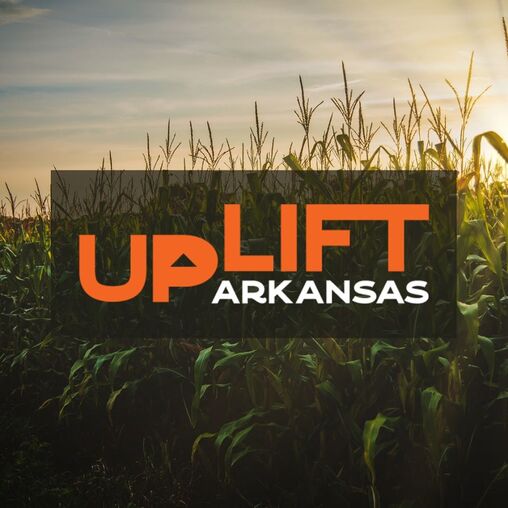
As Arkansans, we know the farming community is vital to our state. The Arkansas Department of Agriculture teamed up with Mangan Holcomb Partners/Team SI and the Little Rock Convention & Visitors Bureau to share https://www.upliftarkansas.com/, a resource to find information on local farmers markets, businesses, restaurants, and other services. Join in to support each other in this unprecedented challenge! #UpliftArkansas #SupportLocal #SupportfARmers
NACD PRESS RELEASE
CONTACT: Sara Kangas, NACD Director of Communications
(202) 547-6223; [email protected]
FOR IMMEDIATE RELEASE
April 13, 2020
NACD REQUESTS ADDITIONAL
SUPPORT FOR CONSERVATION
DISTRICTS IN NEXT STIMULUS WASHINGTON – Today, the National Association of Conservation Districts (NACD) sent a letter to Congress requesting additional funding and legislative support for the nation’s nearly 3,000 conservation districts in the next stimulus bills.
“Conservation districts are the backbone of delivering conservation in America,” NACD President Tim Palmer said. “Unfortunately, as with many small businesses, many conservation districts are currently struggling to continue supporting their communities given the ongoing COVID-19 crisis.”
In the letter, NACD requests Congress expand the Families First Coronavirus Response Act (FFCRA) and Coronavirus Aid, Relief, and Economic Security Act (CARES) to include relief for state and local public-sector entities such as conservation districts that are currently ineligible for the refundable tax credit and payroll assistance programs created under these laws.
Given the state of local economies and the ever-present need for customer service to the nation’s farmers and landowners, NACD also requests that the United States Department of Agriculture (USDA) be authorized to substantially increase the amount of direct hiring authority available to the Natural Resources Conservation Service (NRCS). NRCS receives funding through the annually appropriated Conservation Technical Assistance (CTA) program, which facilitates conservation planning, farm bill program implementation and partnership agreements. In the letter to Congress, NACD requests an additional $75 million in a future stimulus bill for the CTA program to support field offices in local communities and to boost conservation practices that improve our nation’s resources while mitigating future natural disasters.
The letter also includes requests related to critical infrastructure investments for the Watershed Operations and Flood Prevention, Watershed Rehabilitation and Environmental Protection Agency (EPA) 319 Nonpoint Source Grants programs.
“Conservation districts stand ready to work with producers to support our nation’s food system and protect our natural resources during this quickly-evolving crisis,” Palmer said. “It is imperative that Congress provides support to these vital community entities to ensure they can continue to operate in partnership with America’s farmers, ranchers and forestland owners.”
###
About the National Association of Conservation Districts:
The National Association of Conservation Districts is the nonprofit organization that represents the nation’s 3,000 conservation districts, their state and territory associations and the 17,000 men and women who serve on their governing boards. For more than 70 years, local conservation districts have worked with cooperating landowners and managers of private working lands to help them plan and apply effective conservation practices. For more information about NACD, visit: www.nacdnet.org.
(202) 547-6223; [email protected]
FOR IMMEDIATE RELEASE
April 13, 2020
NACD REQUESTS ADDITIONAL
SUPPORT FOR CONSERVATION
DISTRICTS IN NEXT STIMULUS WASHINGTON – Today, the National Association of Conservation Districts (NACD) sent a letter to Congress requesting additional funding and legislative support for the nation’s nearly 3,000 conservation districts in the next stimulus bills.
“Conservation districts are the backbone of delivering conservation in America,” NACD President Tim Palmer said. “Unfortunately, as with many small businesses, many conservation districts are currently struggling to continue supporting their communities given the ongoing COVID-19 crisis.”
In the letter, NACD requests Congress expand the Families First Coronavirus Response Act (FFCRA) and Coronavirus Aid, Relief, and Economic Security Act (CARES) to include relief for state and local public-sector entities such as conservation districts that are currently ineligible for the refundable tax credit and payroll assistance programs created under these laws.
Given the state of local economies and the ever-present need for customer service to the nation’s farmers and landowners, NACD also requests that the United States Department of Agriculture (USDA) be authorized to substantially increase the amount of direct hiring authority available to the Natural Resources Conservation Service (NRCS). NRCS receives funding through the annually appropriated Conservation Technical Assistance (CTA) program, which facilitates conservation planning, farm bill program implementation and partnership agreements. In the letter to Congress, NACD requests an additional $75 million in a future stimulus bill for the CTA program to support field offices in local communities and to boost conservation practices that improve our nation’s resources while mitigating future natural disasters.
The letter also includes requests related to critical infrastructure investments for the Watershed Operations and Flood Prevention, Watershed Rehabilitation and Environmental Protection Agency (EPA) 319 Nonpoint Source Grants programs.
“Conservation districts stand ready to work with producers to support our nation’s food system and protect our natural resources during this quickly-evolving crisis,” Palmer said. “It is imperative that Congress provides support to these vital community entities to ensure they can continue to operate in partnership with America’s farmers, ranchers and forestland owners.”
###
About the National Association of Conservation Districts:
The National Association of Conservation Districts is the nonprofit organization that represents the nation’s 3,000 conservation districts, their state and territory associations and the 17,000 men and women who serve on their governing boards. For more than 70 years, local conservation districts have worked with cooperating landowners and managers of private working lands to help them plan and apply effective conservation practices. For more information about NACD, visit: www.nacdnet.org.
USDA Press RELEASES:
USDA Unveils Tool to Help Rural Communities Address the COVID-19 Pandemic
USDA’s COVID-19 Federal Rural Resource Guide Lists Federal Programs That Can Help Rural Communities, Organizations and Residents Impacted by COVID-19
WASHINGTON, April 13, 2020 – U.S. Secretary of Agriculture Sonny Perdue today unveiled a one-stop-shop of federal programs that can be used by rural communities, organizations and individuals impacted by the COVID-19 pandemic. The COVID-19 Federal Rural Resource Guide (PDF, 349 KB) is a first-of-its-kind resource for rural leaders looking for federal funding and partnership opportunities to help address this pandemic.
“Under the leadership of President Trump, USDA is committed to being a strong partner to rural communities preparing for and impacted by COVID-19,” Perdue said. “This resource guide will help our rural leaders, whether they are in agriculture, education, health care or any other leadership capacity, understand what federal assistance is available for their communities during this unprecedented time.”
USDA has taken many immediate actions to assist farmers, ranchers, producers, rural communities, and rural-based businesses and organizations impacted by the COVID-19 pandemic. For more information on these actions, visit www.usda.gov/coronavirus.
Press Release
Release No. 0217.20
Contact: USDA Press
Email: [email protected]
USDA’s COVID-19 Federal Rural Resource Guide Lists Federal Programs That Can Help Rural Communities, Organizations and Residents Impacted by COVID-19
WASHINGTON, April 13, 2020 – U.S. Secretary of Agriculture Sonny Perdue today unveiled a one-stop-shop of federal programs that can be used by rural communities, organizations and individuals impacted by the COVID-19 pandemic. The COVID-19 Federal Rural Resource Guide (PDF, 349 KB) is a first-of-its-kind resource for rural leaders looking for federal funding and partnership opportunities to help address this pandemic.
“Under the leadership of President Trump, USDA is committed to being a strong partner to rural communities preparing for and impacted by COVID-19,” Perdue said. “This resource guide will help our rural leaders, whether they are in agriculture, education, health care or any other leadership capacity, understand what federal assistance is available for their communities during this unprecedented time.”
USDA has taken many immediate actions to assist farmers, ranchers, producers, rural communities, and rural-based businesses and organizations impacted by the COVID-19 pandemic. For more information on these actions, visit www.usda.gov/coronavirus.
Press Release
Release No. 0217.20
Contact: USDA Press
Email: [email protected]
Farmers, the burden of the #COVID19 pandemic on your livelihoods may have you seeking financial assistance. Our COVID-19 website has information on deferred payments, paycheck protection, and CARES Act benefits to better assist you with location appropriate help for your needs. We are #StillOnTheJob helping Arkansas farmers weather this storm! Visit https://bit.ly/UAEX-Aid-for-Farms for additional information.
Bobby McCARTNEY AWARDED 2020 Outstanding Employee
of the year by the Arkansas
Association of conservation districts
For ImMEDIATE RELEASE
January 17, 2020, Little Rock, AR.
Contact: Karen Brazzeal, Marketing Director
[email protected]
Bobby McCartney has been serving as a financial accountant for three Arkansas conservation districts for over 15 years. Bobby’s tenure in Sebastian County has been 3 1/2 years, Johnson County for 4 1/2 years and Logan County for 15 years. He currently manages financial affairs for all three conservation districts weekly. Bobby was a previous financial accountant for over 32 years at the Wolverine Toy Plant (which became Today’s Kids) in Booneville. Bobby’s current skill and expertise with financial management and grant writing at three conservation districts has propelled Sebastian County Conservation District to new heights in 2019. Sebastian County Conservation District was awarded by the AACD the most outstanding conservation district in the state of Arkansas. Bobby assists three conservation district boards handedly in many ways with his financial expertise. Bobby’s skill and knowledge are impeccable in many ways. He is always willing to go the extra mile to fulfill financial obligations to all three districts wherever possible. Bobby McCartney add immense value and experience to all of the conservation districts he works with weekly. Bobby is valued by our Arkansas partners at AADC, NRCS and ANRC.
Bobby has been married to his wife Judy for over 49 years. They have two children, Shanna Schulte and Jeffery McCartney. They have four grandchildren and two great granddaughters.
Contact: Karen Brazzeal, Marketing Director
[email protected]
Bobby McCartney has been serving as a financial accountant for three Arkansas conservation districts for over 15 years. Bobby’s tenure in Sebastian County has been 3 1/2 years, Johnson County for 4 1/2 years and Logan County for 15 years. He currently manages financial affairs for all three conservation districts weekly. Bobby was a previous financial accountant for over 32 years at the Wolverine Toy Plant (which became Today’s Kids) in Booneville. Bobby’s current skill and expertise with financial management and grant writing at three conservation districts has propelled Sebastian County Conservation District to new heights in 2019. Sebastian County Conservation District was awarded by the AACD the most outstanding conservation district in the state of Arkansas. Bobby assists three conservation district boards handedly in many ways with his financial expertise. Bobby’s skill and knowledge are impeccable in many ways. He is always willing to go the extra mile to fulfill financial obligations to all three districts wherever possible. Bobby McCartney add immense value and experience to all of the conservation districts he works with weekly. Bobby is valued by our Arkansas partners at AADC, NRCS and ANRC.
Bobby has been married to his wife Judy for over 49 years. They have two children, Shanna Schulte and Jeffery McCartney. They have four grandchildren and two great granddaughters.
Holland oaks farm Luncheon
FOR IMMEDIATE RELEASE
Sebastian County Conservation District
Karen Brazzeal, Marketing Director
479-719-5153
[email protected]
Holland Oaks Farm brings community,
urban gardening to Fort Smith
Oct. 21, 2019 Fort Smith, AR, A great gathering of neighbors, community members and staff came together to celebrate the partnership of Sebastian County Conservation District and Holland Oaks Farm on Saturday, Oct. 19th at noon. All of the immediate neighbors were invited to attend the event, in which all attended but a few. The event took place at an outdoor luncheon on the grounds of Holland Oaks Farm which is located on Summit Street inside of Fort Smith behind Central Mall. Attendees got to tour the grounds of the farm, owned by Jimmie and Linda Lincks, which recently produced the first sweet potato harvest among other vegetables. The gardens are being cultivated to produce fresh vegetables for community partners like Hope Campus and the Community Rescue Mission. Jeremy Prater is the Urban Project Coordinator who manages the garden at Holland Oaks Farm. The farm is being funded by a recent NACD Urban Grant awarded to Sebastian County Conservation District in 2019. About 50 people were in attendance to this event on a beautiful fall day. There are talks to make this an annual event where food, fun and fellowship are met with serving our community in relation to urban gardening.
###
If you would like to learn more about Sebastian County Conservation District, awarded the 2019 Most Outstanding Conservation District in Arkansas by the Arkansas Association of Conservation Districts, please contact Karen Brazzeal, Marketing Director at [email protected] or call 479-719-5153.
Sebastian County Conservation District
Karen Brazzeal, Marketing Director
479-719-5153
[email protected]
Holland Oaks Farm brings community,
urban gardening to Fort Smith
Oct. 21, 2019 Fort Smith, AR, A great gathering of neighbors, community members and staff came together to celebrate the partnership of Sebastian County Conservation District and Holland Oaks Farm on Saturday, Oct. 19th at noon. All of the immediate neighbors were invited to attend the event, in which all attended but a few. The event took place at an outdoor luncheon on the grounds of Holland Oaks Farm which is located on Summit Street inside of Fort Smith behind Central Mall. Attendees got to tour the grounds of the farm, owned by Jimmie and Linda Lincks, which recently produced the first sweet potato harvest among other vegetables. The gardens are being cultivated to produce fresh vegetables for community partners like Hope Campus and the Community Rescue Mission. Jeremy Prater is the Urban Project Coordinator who manages the garden at Holland Oaks Farm. The farm is being funded by a recent NACD Urban Grant awarded to Sebastian County Conservation District in 2019. About 50 people were in attendance to this event on a beautiful fall day. There are talks to make this an annual event where food, fun and fellowship are met with serving our community in relation to urban gardening.
###
If you would like to learn more about Sebastian County Conservation District, awarded the 2019 Most Outstanding Conservation District in Arkansas by the Arkansas Association of Conservation Districts, please contact Karen Brazzeal, Marketing Director at [email protected] or call 479-719-5153.
SEBASTIAN COUNTY CONSERVATION DISTRICT REACHES New Heights with Drone
- F
- FOR IMMEDIATE RELEASE
- Sebastian County Conservation District
Karen Brazzeal, Marketing Director
479-719-5153
[email protected] - Sept. 30, 2019, Fort Smith, AR, The Sebastian County Conservation District has acquired a state of the art drone, making it the first Conservation District in the state of Arkansas to fly this upscale technology. The district also has two newly licensed FAA commercial pilots with Part 107 certification, Harrison Sears and William Baggett. The drone will enhance the capabilities of the Conservation District by utilizing it with farmers and landowners. The drone will be used to enhance forage improvement by doing pasture surveys, forestry surveys, and monitor the spread of invasive plants. The drone also has the ability to create current maps of land and pastures that can benefit farmers and landowners alike.
- The drone’s state of the art capabilities include the ability to shoot 5.2K in 30 frames per second and 4K in 60 frames per second. It also has an anti-collision feature and is one of the only drones that is omnidirectional gimble. The drone can also be used for marketing and promotion of the Sebastian County Conservation District various projects, as well as for other Conservation Districts across the state. The new uses of the drone are limitless when it comes to conservation in Sebastian County and across the state.
- ###
- If you would like to learn more about Sebastian County Conservation District, awarded the 2019 Most Outstanding Conservation District in Arkansas by the Arkansas Association of Conservation Districts, please contact Karen Brazzeal, Marketing Director at [email protected] or call 479-719-5153.
- Drone footage shown above of Doug Ellison's farm, currently on the Board of Directors at Sebastian County Conservation District. This footage was shot from the newly purchased drone on Sept. 7th, 2019.
NEWS ARTICLES
ARkansas Times 'Flavors' Magazine Mentions
Sebastian County ConservAtion district
In June 2019 Issue
2019 Outstanding Conservation District Award
Feb. 19, 2019
Sebastian, Crawford conservation districts win state award
Times Record Staff
The Sebastian and Crawford County conservation districts were the recipients of a distinguished award last week. Karen Brazzeal, marketing director for the Sebastian County Conservation District, said the districts were awarded the outstanding conservation district award for 2019 by the Arkansas Association of Conservation Districts during a meeting in North Little Rock Wednesday. This is the first time a joint conservation district has won the award.
“We have been a conservation district since the early 1900s, and this is our first time to receive the award,” Brazzeal said. The award was announced during a meeting of the Sebastian County Conservation District Board of Directors on Thursday.
“It’s a great honor, and we were well-represented yesterday at the AACD Meeting,” Brazzeal said.
Feb. 19, 2019
Sebastian, Crawford conservation districts win state award
Times Record Staff
The Sebastian and Crawford County conservation districts were the recipients of a distinguished award last week. Karen Brazzeal, marketing director for the Sebastian County Conservation District, said the districts were awarded the outstanding conservation district award for 2019 by the Arkansas Association of Conservation Districts during a meeting in North Little Rock Wednesday. This is the first time a joint conservation district has won the award.
“We have been a conservation district since the early 1900s, and this is our first time to receive the award,” Brazzeal said. The award was announced during a meeting of the Sebastian County Conservation District Board of Directors on Thursday.
“It’s a great honor, and we were well-represented yesterday at the AACD Meeting,” Brazzeal said.
Follow the link to Drone Article Oct. 7, 2019 in the N.w. Arkansas Democrat GaZette:
FOLLOW THE LINK TO THE OCT. 1, 2019 DRONE 5 NEWS STORY:
https://5newsonline.com/2019/10/01/sebastian-county-conservation-district-reaches-new-heights-with-drone/
Follow the link to the Oct. 1, 2019 Drone Times Record Article:
www.swtimes.com/news/20190930/conservation-district-acquires-drone-award
Follow the link to the Holland Oaks Farm Contract May 5, 2019 signing in the Times Record article:
https://:www.swtimes.com/news/20190509/fort-smith-farm-to-be-setting-for-new-conservation-district-project
https://:www.swtimes.com/news/20190509/fort-smith-farm-to-be-setting-for-new-conservation-district-project
Follow the link to the Feb. 14, 2019 Times Record article:
www.swtimes.com/news/20190214/sebastian-county-grant-to-aid-crawford-county-projects
www.swtimes.com/news/20190214/sebastian-county-grant-to-aid-crawford-county-projects
Follow the link to the Dec. 28, 2018 Times Record article:
SWTIMES.COM/NEWS/20181228/CONSERVATION-DISTRICT-PUTS-FINAL-TOUCHES-ON-REPORT
SWTIMES.COM/NEWS/20181228/CONSERVATION-DISTRICT-PUTS-FINAL-TOUCHES-ON-REPORT
Follow the link to the Aug. 10, 2018 Times Record article:
swtimes.com/news/20180810/fort-smith-forum-promotes-rain-gardens
swtimes.com/news/20180810/fort-smith-forum-promotes-rain-gardens
Follow the link to the Aug, 9, 2018 Times Record article:
www.swtimes.com/news/20180809/rain-gardens-stormwater-runoff-focus-of-fort-smith-meeting-thursday
www.swtimes.com/news/20180809/rain-gardens-stormwater-runoff-focus-of-fort-smith-meeting-thursday
Follow the link to the July 4, 2018 Times Record article:
swtimes.com/news/20180704/efficient-sustainable-gardening-goal-of-sebastian-county-conservation-district
swtimes.com/news/20180704/efficient-sustainable-gardening-goal-of-sebastian-county-conservation-district

